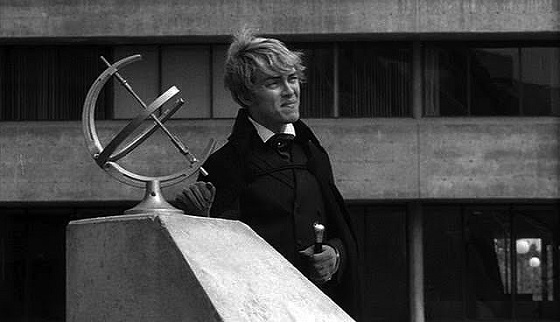It’s always fun to look back at an important and influential filmmaker’s early work. Whether it’s revisiting the old films of Hollywood royalty, such as George Lucas’ THX 1138 or Steven Spielberg’s Duel, or checking out the initial projects of genre icons, like John Carpenter’s Dark Star or Wes Craven’s The Last House on the Left, seeing the visions of developing artists never disappoints. One of these early pictures that set the stage for a successful film career is the first film by horror legend David Cronenberg, an artsy little science fiction shocker made in 1969 called Stereo.

Taking place at an institution called the Canadian Academy for Erotic Inquiry, Stereo is about a group of psychics who are brought together by an enigmatic unseen man named Doctor Luther Stringfellow. The point of the experiment is for the subjects to develop their telepathic abilities through non-verbal communication. So, the psychics wander the halls and silently interact with each other while the researchers wonder whether a single member of the group will materialize as a dominant figure or if all seven of them will merge their powers together. The telepathists’ experiences with each other become more sexual and more violent as the experiment goes on. The group works towards a psychic cohesion, but some of them may not survive the ordeal.

Presented in a documentary style, Stereo was shot in high-contrast black & white on the campus of David Cronenberg’s alma mater, the University of Toronto, for about $3500, and for the most part, it looks it; it has the distinct vibe of a student film. It was truly a one man show, with Cronenberg producing, writing, directing, photographing, and editing the entire thing. Cronenberg basically got seven actors, strolled into a bunch of empty rooms, and made a movie. There’s not a whole lot of plot to it, but it still manages to be compelling. Stereo may be a bit too artsy for the casual Cronenberg fans, there’s plenty in it for the hardcore fans.

While Stereo doesn’t have any of the creative makeup effects or crazy animatronics of the fan-favorite Cronenberg classics, there are many themes in the film that would creep their way into his later work. The psychic tension is a perfect precursor to Scanners and The Dead Zone. The dirty sexuality would eventually find its way into Videodrome. The meticulous scientific methodology pops up in The Fly and A Dangerous Method. In short, Stereo is budget Cronenberg; it’s got all of the horrifying violent and erotic imagery without the expensive practical special effects and big-budget Hollywood stars. It’s exactly was it is: a first Cronenberg film.

There’s an amazingly minimalistic aesthetic to Stereo that is nothing short of remarkable. Cronenberg makes the most of what he’s got, emphasizing the cold, concrete rooms of the campus to give the location a very impersonal feel. The cast wears an array of costumes that makes it difficult to determine the historical era of the movie; futuristic tunics are combined with medieval cloaks, giving the cast an almost confusing look of timelessness. Stereo is full of surreal dream sequences and ethereal imagery, some of it quite frightening, that just keeps the viewer wondering what the hell it is that they’re seeing. It’s difficult to describe Stereo, it just has to be seen to be believed.

The sound in Stereo is another element of the film that’s worth mentioning. Basically, there isn’t any. The bulky film camera that Cronenberg used to shoot was too loud for any location sound to be used, so he didn’t; the only audio in the film is a whole lot of voiceover narration that was added in post-production. The black & white photography coupled with the scientific audio commentary gives Stereo the look and feel of an old educational movie, like a school filmstrip or a public service documentary. It’s another case of Cronenberg brilliantly using the resources available to him to make the most effective film possible. And it works. Stereo is a strange film, even by David Cronenberg standards, but no one can say that it’s not a well-made, economical picture.

The arc of David Cronenberg’s career is a unique one, going from the body horror of The Brood to the alternate reality of eXistenZ, then from the psychological brutality of A History of Violence to the arthouse weirdness of Cosmopolis. He’s had a long and storied career, and it all started with Stereo.